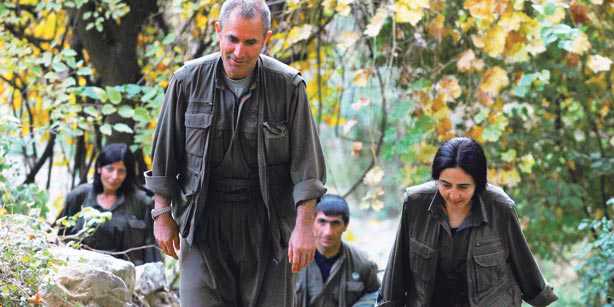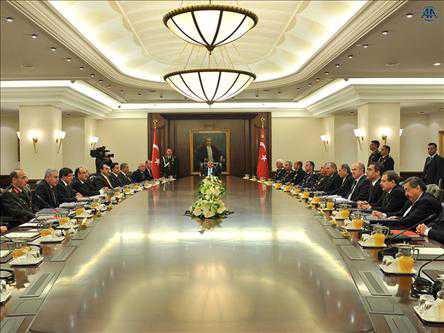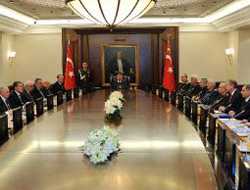Editor’s Note: Steven A. Cook is the Hasib J. Sabbagh Senior Fellow for Middle Eastern Studies at the Council on Foreign Relations. He is the author of The Struggle for Egypt: From Nasser to Tahrir Square, to be published this fall.
By Steven A. Cook, Foreign Affairs

Cars drive on a bridge crossing the Nile River on February 9, 2006 in Central Cairo, Egypt. (Getty Images)
In the weeks and months since Egypt’s military officers forced then President Hosni Mubarak from power and assumed executive authority, the country’s military rulers have shown an interest in applying what many have taken to calling the “Turkish model.” Spokesmen for the Supreme Council of the Armed Forces (SCAF), along with some civilian politicians, have floated the idea of replicating in Egypt today aspects of a bygone era in Turkish politics.
Despite some similarities between the Egyptian and Turkish armed forces, Egypt’s officers would be ill advised to try to emulate their counterparts in Turkey. Not only would they be bound to fail but, in the process, would make the struggle to build the new Egypt far more complex and uncertain.
Egypt’s military commanders are not so much interested in the latest manifestation of the Turkish model, in which a party of Islamist patrimony oversees political and economic reforms as part of an officially secular state, but rather an older iteration of it. This version of the Turkish model was a hallmark of Turkey’s politics from the time of the republic’s founding in 1923 until the early 2000s. It offers a template for civil-military relations in which the military plays a moderating role, preventing – at times, through military-led coups – the excesses of civilian politicians and dangerous ideologies (in Turkey’s case, Islamism, Kurdish nationalism, and, at one time, socialism) from threatening the political order.
Turkey’s political system had a network of institutions that purposefully served to channel the military’s influence. For example, the service codes of the armed forces implored officers to intervene in politics if they perceived a threat to the republican order, and military officers held positions on boards that monitored higher education and public broadcasting. Meanwhile, various constitutional provisions made it difficult for undesirable groups – notably, Islamists and Kurds – to participate in the political process.
The most prominent among the military’s channels of influence was the Milli Guvenlik Kurulu, or National Security Council, (known by its Turkish initials, MGK). Turkey’s 1982 constitution directed civilian leaders to “give priority consideration” to the council’s recommendations so as to preserve “the existence and independence of the State, the integrity and indivisibility of the country, and the peace and security of the country.” The MGK’s directives were rarely defied. The officers who served on the council had a definition of national security that ranged well beyond traditional notions of defense policy, including everything from education and broadcasting to the attire of politicians and their wives.
In some ways, the SCAF would not have to do much to approximate the Turkish model on the Nile. The two militaries do share some important similarities. For example, like the Turkish General Staff, which worked tirelessly to ensure the political order that Mustafa Kemal Atatürk and his commanders established after the end of World War I, the Egyptian officer corps has long maintained a commitment to the regime that its predecessors, the Free Officers, founded in the early 1950s. In both the Turkish and Egyptian cases, this sense of responsibility stems from a sense that the military, equipped with the best organization and technology, is set off from the rest of society and is the ultimate protector of national interests. This outlook tends to breed a suspicion – even hostility – toward civilian politicians.
In addition, both militaries developed robust economic interests directly tied to their countries’ political systems. In Turkey, the armed forces became part of an economic landscape that favored large holding companies controlled by a few established families whose economic interests were connected to the status quo. In Egypt, the military itself is directly involved in a wide array of economic activities, including agriculture, real estate, tourism, security and aviation services, consumer goods, light manufacturing, and, of course, weapons fabrication.
Both the Turkish General Staff and Egypt’s present-day officers have an aversion to politics and the day-to-day running of their countries. They prefer to leave the responsibilities and risks of governing to civilians, or, in Egypt’s case, to a delegate from the armed forces. This sort of arrangement is precisely what it means to rule but not govern.
Now, with the SCAF effectively in control of Egypt, there is evidence that some Egyptians, both civilians and officers, are studying the Turkish model and its political implications. Since assuming power in February, the Egyptian military has taken measures to shield commanders from prosecution in civilian courts, a protection Turkey’s parliament just stripped from its own officer corps. They have also floated proposals through non-military representatives to shield the defense budget from parliamentary oversight, maintain ultimate authority over defense policy, and even establish a National Defense Council that resembles features of Turkey’s MGK before that body was brought to heel in 2003 through constitutional reforms. And the participation of military officers in Egypt’s electoral commission looks a lot like the Turkish military’s surveillance of society through membership on various government boards.
If the officers’ moves seem like a backhanded way of creating the conditions favorable for an enduring political role for the Egyptian army, they are. Still, members of the SCAF have been careful to say that they will abide by Egypt’s new constitution when Egyptians ratify the yet-to-be written document. They say that whatever role the Egyptian people assign to them is the role that they will respectfully fulfill. Of course, if the Egyptian people want some approximation of the Turkish model, then the military is bound to discharge that mission.
Yet if the members of the SCAF truly want to be like their Turkish counterparts, they are going to have to be more directly involved in the constitution writing process. Although some of the intellectuals, judges, and other figures on the National Council who are charged with drafting constitutional principles favor the military’s continued presence in politics, their support is unlikely to be enough given the mistrust with which revolutionary groups and others view the military.In Turkey, although the military was not directly involved in writing the 1961 constitution, the country’s officers stepped in a decade later to tighten up aspects of the document that they deemed to be too liberal. A little less than ten years later, Turkey’s generals stepped in again and directly oversaw the writing of a new constitution (which the country is now considering abolishing and replacing with a new document) that not only reinforced existing levers of military influence but also created additional means for the armed forces to intervene in the political system.
The development of a Turkish-style role for the Egyptian officer corps also presumes that there is broad elite support for such a system. In Turkey, the officers enjoyed the support of judges, lawyers, academics, the press, big business, and average Turks who were committed to the defense of Kemalism against far smaller groups of Islamists and Kurds who were long considered to be outside the mainstream.
Despite some high-profile advocates, such as the politician Amr Moussa and the judge Hisham Bastawisi, there are few influential supporters for the military becoming the arbiter of Egyptian politics. This does not bode well for the military should they seek to replicate the Turks. On the eve of recent protests intended to pressure the SCAF to meet various revolutionary demands, more than two dozen political parties demanded that the military outline when and how it will hand over power to civilians.
The only place where the military has support is among the Muslim Brotherhood. This is significant. Indeed, the Brotherhood was a central player in an effort to bring a million people into the streets last Friday to demonstrate their support for the SCAF. Yet as important as the Brotherhood’s support for the military may be, the officers should take little comfort from its embrace. The Islamists in the Brotherhood do not support the military as much as they want to undermine the revolutionary groups, liberals, and secularist parties that they oppose.
In addition, the Brotherhood and the officers are – just as they were in the early 1950s – competitors rather than collaborators. For its part, the Brotherhood can make claims to being better nationalists and potentially better stewards of Egypt than the armed forces, which are tainted by their association with the United States and Mubarakism. Whatever backing the Brotherhood is currently offering the military and the SCAF is surely tactical and does not extend to carving out a political role for the officers after a transition to civilian leaders.
Finally, the most important feature of Turkey’s system under the tutelage of the military was the Turkish officers’ singular ideological commitment to Kemalism. This was a motivating factor for generations of officers and their civilian supporters.
In contrast, it remains unclear exactly what the SCAF believes in. The Egyptians are not die-hard secularists, democrats, Islamists, or authoritarians. Other than generic platitudes about democracy and respect for the Egyptian people, the officers seem only interested in stability, maintaining their economic interests, and preserving the legitimacy of the armed forces despite having been the backbone of a thoroughly discredited regime for 60 years. As a result, the SCAF seems to be willing to hand over power to anyone who can guarantee those three interests. It is this kind of political opportunism that is fatal to a Turkish model on the Nile. Without a compelling narrative about what Egyptian society should look like and the role of the military in realizing this vision, it is unlikely that the officers will garner the kind of support necessary in order for elites to voluntarily give up their own potential power in favor of military tutelage.
For all of the political dynamism, energy, and creativity that Egyptians have demonstrated since Mubarak’s fall, the country is also wracked with a host of debilitating problems: persistent protests, economic problems, political intrigue, intermittent violence, and a general state of uncertainty. To some Egyptians, it seems that the military’s firm hand is necessary to keep all of the country’s political factions in line while building the new Egypt. After all, the Turkish officers tamed Turkey’s fractious and sometimes violent political arena, and the country is now freer than ever before.
But such analysis is backward. Turkey’s democratic changes, which remain far from complete, happened despite the military, not because of it. Regardless, attempts to replicate in Egypt aspects of Turkey’s experience would be met with significant opposition, increased political tension, more uncertainty, and potential violence, all of which create the conditions for the emergence of new authoritarianism. With the many potential drawbacks of trying to copy the Turkish armed forces, the Egyptian officers should not even bother trying.
The views expressed in this article are solely those of Steven A. Cook. For more excellent long-form analysis, visit Foreign Affairs.




